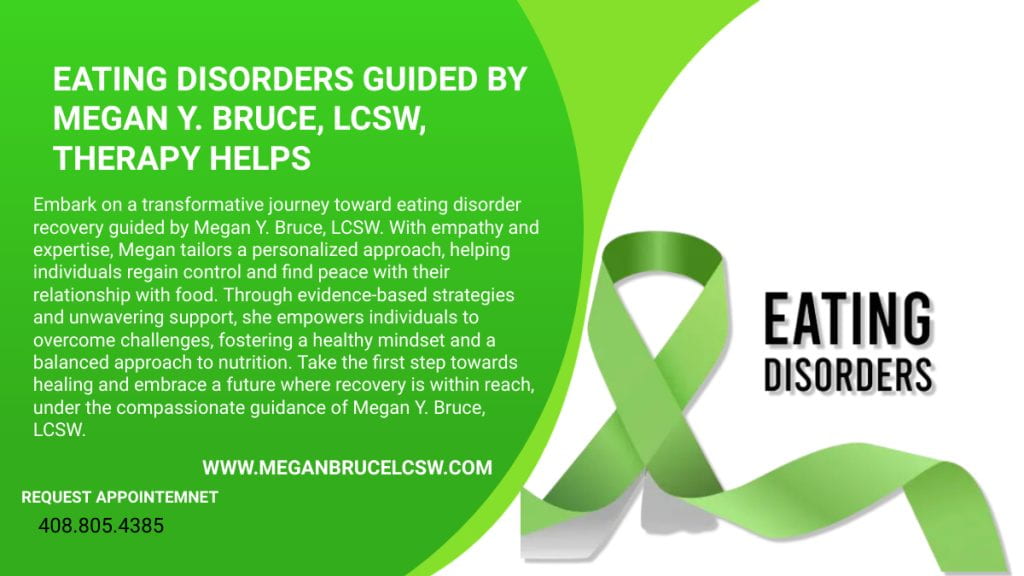Unveiling the Healing Power: The Effectiveness of Therapy in Treating Eating Disorders
Author : Meganbruce Lcsw | Published On : 19 Nov 2023

Introduction:
Eating disorders, encompassing conditions such as anorexia nervosa, bulimia nervosa, and binge-eating disorder, are complex mental health challenges that affect millions of individuals worldwide. While the causes of eating disorders are multifaceted, therapy has emerged as a cornerstone in the treatment approach, offering a path towards recovery. In this article, we explore the effectiveness of therapy in addressing the complexities of eating disorders and fostering sustainable healing.
A Holistic Approach to Healing:
Eating disorders often stem from a combination of genetic, biological, psychological, and environmental factors. Recognizing the intricate interplay of these elements, therapists employ a holistic approach to treatment. Various therapeutic modalities are utilized, with each designed to address specific aspects of the disorder, promoting both mental and physical well-being.
Cognitive Behavioral Therapy (CBT):
Cognitive Behavioral Therapy, commonly known as CBT, is widely recognized as one of the most effective therapeutic approaches for eating disorders. It operates on the principle that thoughts, feelings, and behaviors are interconnected. CBT aims to identify and modify distorted thought patterns related to body image, self-worth, and food, fostering healthier behaviors and attitudes.
Megan Y. Bruce, LCSW, a seasoned therapist specializing in eating disorders, highlights the transformative impact of CBT in her practice. “CBT allows individuals to challenge and reframe negative thought patterns, ultimately paving the way for behavioral changes. It’s about empowering individuals to develop a more balanced and constructive relationship with food and their bodies.”
Dialectical Behavior Therapy (DBT):
Dialectical Behavior Therapy, known as DBT, is another therapeutic approach that has proven effective in the treatment of eating disorders. Originally developed for borderline personality disorder, DBT incorporates mindfulness, emotion regulation, and interpersonal effectiveness skills. In the context of eating disorders, DBT addresses emotional dysregulation, a common feature of these conditions.
“DBT equips individuals with practical skills to manage intense emotions without resorting to destructive behaviors like binge eating or purging,” explains Megan Y. Bruce. “It’s about building a toolbox of coping mechanisms that contribute to emotional resilience and well-being.”
Acceptance and Commitment Therapy (ACT):
Acceptance and Commitment Therapy, or ACT, focuses on accepting and embracing one’s thoughts and emotions while committing to positive behavioral changes aligned with personal values. This approach is particularly powerful in addressing the shame and guilt often associated with eating disorders.
Megan Y. Bruce emphasizes the role of ACT in fostering a values-driven life. “ACT encourages individuals to move towards a life that is meaningful and fulfilling. It’s about recognizing that you can’t always control your thoughts, but you can choose how you respond to them and what actions you take in line with your values.”
Psychodynamic Therapy, rooted in psychoanalytic principles, explores the unconscious mind and interpersonal relationships to gain insight into present-day behaviors. This approach delves into the underlying dynamics that contribute to eating disorders, often rooted in early life experiences and unresolved conflicts.
“Psychodynamic Therapy offers a depth-oriented exploration of the unconscious processes that influence thoughts and behaviors,” says Megan Y. Bruce. “It’s about understanding the roots of the disorder and fostering insight that contributes to lasting change.”
The Therapeutic Alliance:
Beyond specific therapeutic modalities, the therapeutic alliance between the individual and the therapist plays a pivotal role in the effectiveness of eating disorder treatment. Establishing trust, providing a safe space for exploration, and fostering a collaborative relationship contribute to the overall success of therapy.
“Building a strong therapeutic relationship is fundamental,” notes Megan Y. Bruce. “It creates an environment where individuals feel heard, understood, and supported. This connection is a catalyst for positive change.”
Conclusion:
Therapy emerges not only as a valuable tool but as an essential component in the comprehensive treatment of eating disorders. Whether through CBT, DBT, ACT, Psychodynamic Therapy, or a combination of approaches, therapy provides individuals with the guidance, support, and skills needed to navigate the complexities of their struggles. In the hands of dedicated and skilled therapists like Megan Y. Bruce, LCSW, therapy becomes a beacon of hope, offering a transformative journey towards healing, recovery, and a renewed relationship with food and self.
Discover healing insights into the Treatment of Eating Disorders with therapist, Megan Y. Bruce. Specializing in helping individuals overcome the challenges of eating disorders, Therapist Megan provides compassionate and effective therapy. Based in the heart of San Francisco, CA, therapist Megan Y. Bruce offers support and guidance to empower individuals on their path to recovery. Reach out today at 408.805.4385 to embark on your journey towards a healthier and happier life.
